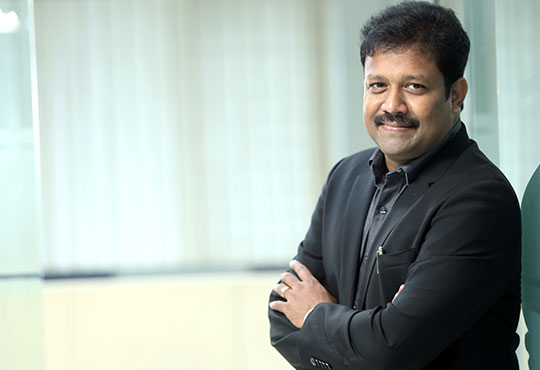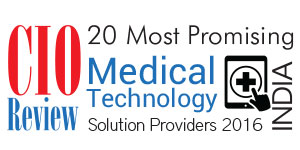 Back in the days of the BPO industry boom, outsourcing knowledge-driven processes was not really the norm. And outsourcing critical healthcare was not even on the “maybe” list! But, it was an opportunity that could create a whole new industry, an opportunity that would offer value to both the service provider and the healthcare establishment.
Back in the days of the BPO industry boom, outsourcing knowledge-driven processes was not really the norm. And outsourcing critical healthcare was not even on the “maybe” list! But, it was an opportunity that could create a whole new industry, an opportunity that would offer value to both the service provider and the healthcare establishment.Somebody needed to get out there and create that space, educate healthcare enterprises and persuade them to outsource elements of business that they considered as core. But, before that, this needed to be done right! It was crucial that the basic steps were laid out perfectly. Learning what this potential opportunity had to offer, setting up a well-oiled delivery system, convincing the potential stakeholders that it will work and following through with the promises that were made was a mammoth task.
An idea is only an idea till it is researched, developed and delivered… and no one understood that better than Mr. Sathya Kumar R, Founder and CEO of Techindia—an organization that is a pioneer in offering scalable, superior, dependable and cost-effective knowledge-driven services for the demanding healthcare industry. One can easily say that Sathya is a visionary, whose ideas are way ahead of his time. A decade ago, he was the “somebody” that decided to discover the value hidden in outsourcing the core, knowledge-driven part of the healthcare business-his hard work and precision paid off! Healthcare establishments saw the value in what he was proposing.
As a result of having access to a larger pool of skilled workforce, businesses began to perform better, revenues increased, costs decreased, and edge over competition improved. Today, he is an efficacious entrepreneur running a successful healthcare management services enterprise (also Asia’s largest) in India.
DISCOVERING THE VALUE IN THE ‘POTENTIAL’ OPPORTUNITY
For Sathya, choosing a path that was then unique and hence risky came with a whole bunch of challenges. First off, the customer acquisition curve is steep considering the fact that no business wants to outsource its “core”. To start with you need to determine an offering, articulate the USP and scout for customers with the hope that they will buy into your idea. Then, you invest and build a sustainable delivery ecosystem, learn about your customer’s business, identify pain areas, pinpoint opportunities and then propose how you are going to solve their problems for them. You need to conduct research, pilot programs and come up with innovative ideas mostly on no-obligation basis, to
instill confidence and increase trust.
No matter what you do, on the flipside there can be premature engagement closures and short-term test projects that never convert into long-term retainer clients. You must at all times, be ready for sudden surges in business and ensure that your delivery system is well prepared to support any eventuality.
All this costs a whole lot with absolutely little or zero guarantee that it will work. However, Sathya took the plunge, braved the first few years and positioned himself to take advantage of the changes in the industry, the market place and the world!
Today, healthcare management is a well-established industry and is only growing. In fact, Deloitte Touche Tohmatsu India has predicted that with increased digital adoption, the Indian healthcare market, which is worth USD 100 billion, is likely to grow at a CAGR of 23 percent (i.e., US$ 280 billion) by 2020.
The need for comfort and convenience is driving physicians and patients alike towards adopting the new digital ‘connected health’ phenomenon. Physicians find that they are able to perform better when they have all the information at their fingertips. To meet the needs of the people healthcare establishments are trying to stay with the new generation in a cost-effective and efficient manner-outsourcing a bunch of its knowledge-driven work.
HEALTHCARE SERVICES OUTSOURCING: BENEFITS
For healthcare establishments, when outsourcing, skilled workforce is definitely a great benefit. However, cost still remains priority as skilled experts in countries such as South-east Asia and South America are priced at less than half of what the company would spend in its home country. Other benefits include: flexibility to increase or reduce staff as required; and consistent execution of work (advantage of being in different time zones).
While the above benefits are highly valued by enterprises, there are a whole lot of other intricacies that need to be taken into consideration when providing knowledge-driven services to the healthcare industry. After all, it is someone’s life at stake and taking accountability for a life is an extremely huge responsibility. Here are a bunch of benefits that outsourcing can bring to the table:
• Increased profitability: Easy access to a competitively priced yet skilled workforce and world-class infrastructure helps enterprises save bottom line costs by almost 40 percent. This obviously helps their topline margins and increases profits. Also, considering that the patients are being monitored from wherever they are for most conditions, we can prevent hospital re-admissions.
• Access to trained and experienced professionals: Patient monitoring requires not just skill, but also dedication. It is a carefully and accurately analysed report, where every minute medical decisions are scrutinized, re-scrutinized, and rigorously tested as per strictly set SLAs before it is shared with the caregiver. These professionals are proficient and are ready to take on projects of any size and complexity, with minimum directorial hassles.
• Quality patient care: The patient’s comfort and well-being is the foundation of high-quality healthcare. Whether it is cardiac, sleep or general vital statistics, the monitored reports are analysed and digitally ready on demand for the doctor to review and decide next steps in patient care.
Cost-effectiveness: Since in-depth knowledge of the chosen field and consistent precision is key to ensuring meticulous reports, local resources can end up being very expensive, especially if the workforce in question is skilled and trained to carry out high profile medical analysis work. Also, retaining staff, acquiring new ones in case the need arises and training them is challenging and costly. When outsourced, your concerns are reduced by more than half.
HEALTHCARE SERVICES OUTSOURCING: BENEFITS
For healthcare establishments, when outsourcing, skilled workforce is definitely a great benefit. However, cost still remains priority as skilled experts in countries such as South-east Asia and South America are priced at less than half of what the company would spend in its home country. Other benefits include: flexibility to increase or reduce staff as required; and consistent execution of work (advantage of being in different time zones).

As a result of having access to a larger pool of skilled workforce, businesses began to perform better, revenues increased, costs decreased, and edge over competition improved.
While the above benefits are highly valued by enterprises, there are a whole lot of other intricacies that need to be taken into consideration when providing knowledge-driven services to the healthcare industry. After all, it is someone’s life at stake and taking accountability for a life is an extremely huge responsibility. Here are a bunch of benefits that outsourcing can bring to the table:
• Increased profitability: Easy access to a competitively priced yet skilled workforce and world-class infrastructure helps enterprises save bottom line costs by almost 40 percent. This obviously helps their topline margins and increases profits. Also, considering that the patients are being monitored from wherever they are for most conditions, we can prevent hospital re-admissions.
• Access to trained and experienced professionals: Patient monitoring requires not just skill, but also dedication. It is a carefully and accurately analysed report, where every minute medical decisions are scrutinized, re-scrutinized, and rigorously tested as per strictly set SLAs before it is shared with the caregiver. These professionals are proficient and are ready to take on projects of any size and complexity, with minimum directorial hassles.
• Quality patient care: The patient’s comfort and well-being is the foundation of high-quality healthcare. Whether it is cardiac, sleep or general vital statistics, the monitored reports are analysed and digitally ready on demand for the doctor to review and decide next steps in patient care.
Cost-effectiveness: Since in-depth knowledge of the chosen field and consistent precision is key to ensuring meticulous reports, local resources can end up being very expensive, especially if the workforce in question is skilled and trained to carry out high profile medical analysis work. Also, retaining staff, acquiring new ones in case the need arises and training them is challenging and costly. When outsourced, your concerns are reduced by more than half.




